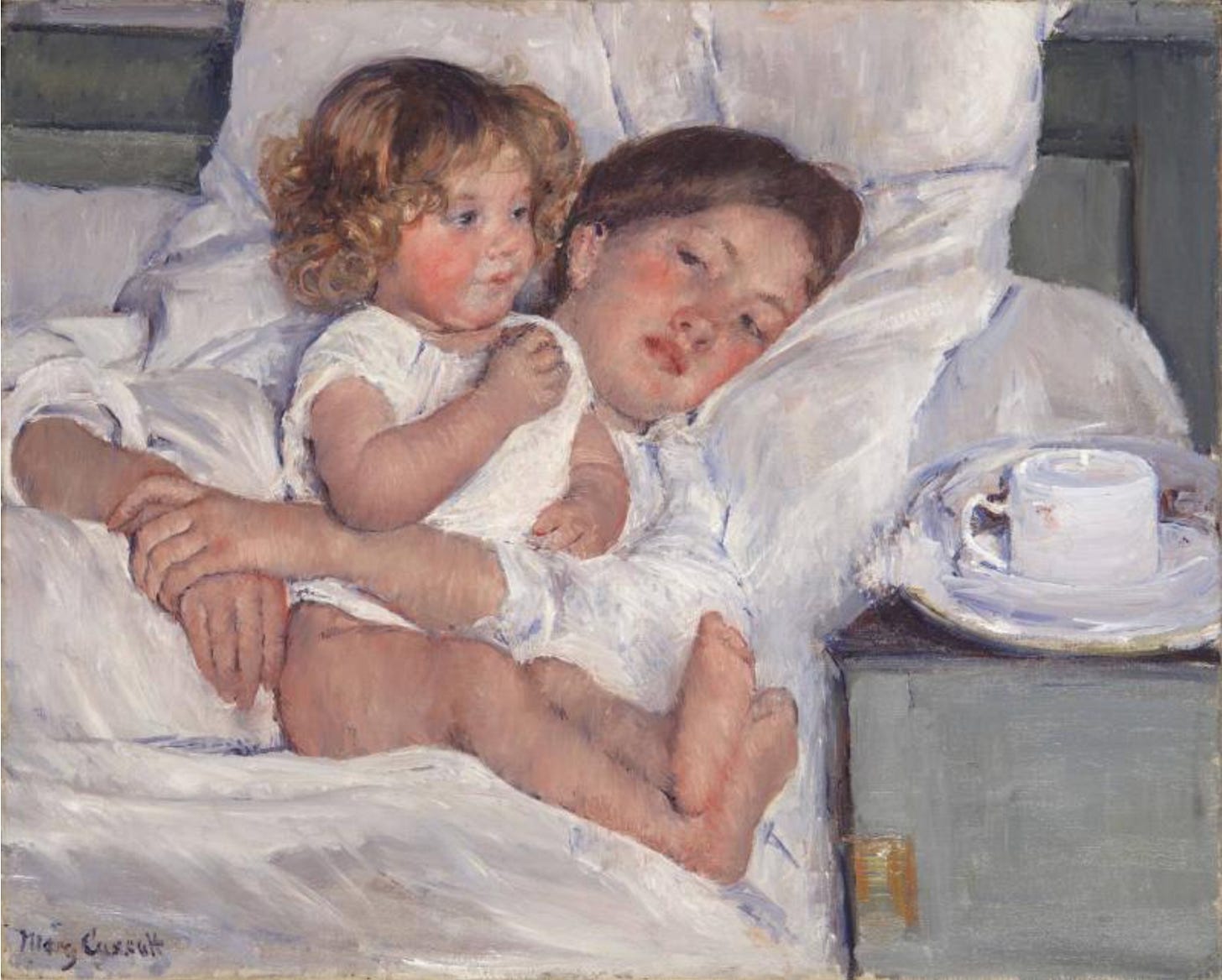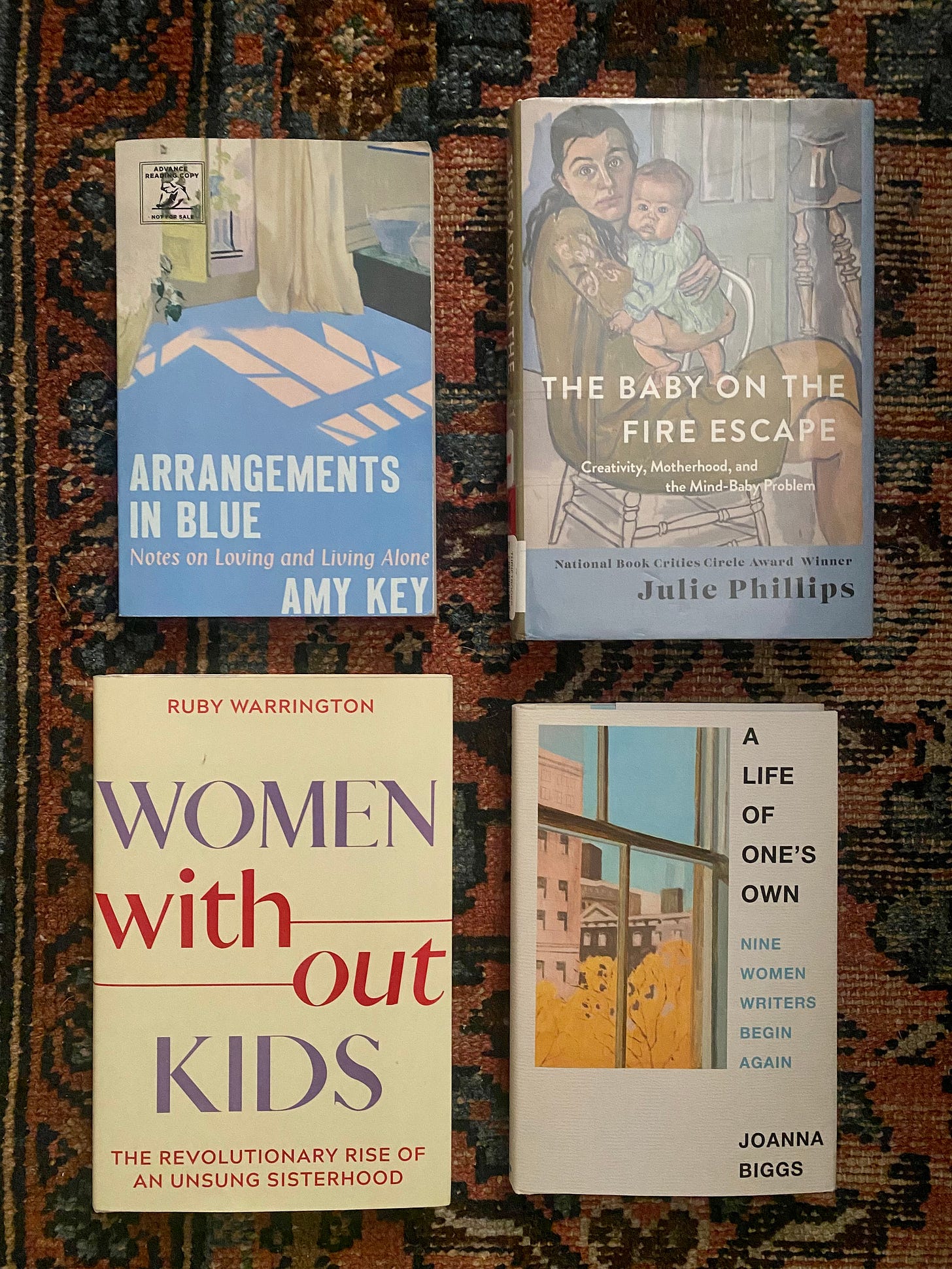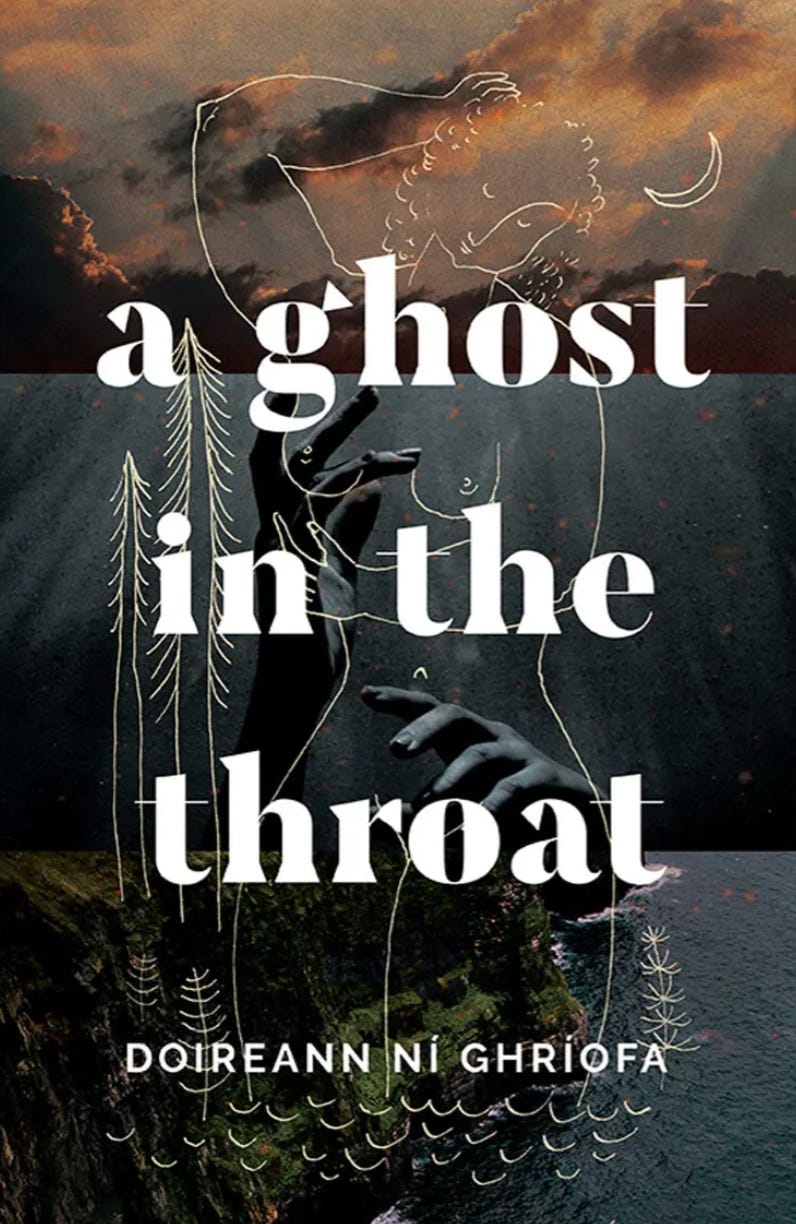How do we navigate social pressures and inequality and make meaningful lives? How do we find time to think, write, make art? A growing stack of books in my library (cluttered bedroom) probes these questions by thinking through the relationship between womanhood, solitude, creativity, and motherhood. This month I read a couple of these, read parts of the others, and found it a comfort. It’s impossible not to note that while these books are not all about white women, they are all written by white women, a reminder of how much the ability to find time and space to think deeply about the “mind-baby problem,” as Julie Phillips puts it, is conditioned by race and other structural factors.
Possibly because I have gorged myself for years on books about women and their babies while raising my own kids, or possibly because I go through periods of feeling annoyed by the dominant mom culture (see this tweet), I’m especially interested lately in books by/about women without children.
Arrangements in Blue: Notes on Loving and Living Alone by British poet Amy Key is a memoir about, I guess, being single? Thought that’s reductive, it’s much richer than that. Really, it’s about getting comfortable with oneself, making one’s own serenity, holding at one and the same time a powerful desire for romantic love and the knowledge that such love might also chip away at a hard-won beauty, equilibrium, acceptance. The book is framed by Joni Mitchell’s album Blue, which is present as a kind of loose guiding text but never imposed as an organizing (constraining) principle. This is the kind of thing I absolutely love but that mainstream publishers almost never let writers get away with, so bravo to Amy Key.
On the subject of women “alone,” there is so much sappy or just crappy pop culture, but very little sustained engagement, and I appreciate that Key really takes her time parsing both the idea and the experience of solitude. Her writing is lovely and lyrical and her thinking is so sharp. She writes about the romance of being alone, especially curating a beautiful home for herself after years of financial struggle, as well as the dailiness of it, the self-interrogation, the uncomfortable moments of coming up against others’ judgments or just others’ smug family formations (I know these feelings well). I especially loved a chapter that deals honestly with the disappointments of traveling solo. I thought about my own tendency to hum nervously when alone amid throngs of families in a foreign place. Key writes about the way certain possibilities are slowly foreclosed by the passage of time with a kind of wonder that is very resonant to me in my 40s. The many paths not taken—oof. For years, for Key, romantic love didn’t happen, children didn’t happen, and this ruminative book is an exploration of those absences, an acknowledgment of everyday grief, and also a loving account of the life and the community she has made. I loved it.
I was reminded while reading of a Morrissey song (problematic to the max, I know), “Will Never Marry,” and the melodramatic line I loved to sing when I was young: I will live my life as I will undoubtedly die: alooooone. (I have a Morrissey lyric at the ready for literally everything, a now worse-than-useless skill.)
Another book I loved this month is Women Without Kids: The Revolutionary Rise of an Unsung Sisterhood by Ruby Warrington, whom I’m lucky to know. I’m not alone in describing this book as liberating and if I were in charge of the world I’d prescribe it for all to read, especially mothers, for whom I think it offers a bracing, exciting reframing of our life choice. Warrington uses research and her personal experience to make a nuanced case for taking not having kids seriously. She writes about the insidiousness of social expectations, the power of interrupting cycles of dysfunction, and the thrill of learning acceptance. She challenges the specter of regret that looms over the decision not to have kids (citing Orna Donath, Warrington writes that women are manipulated by this “politicized use of emotion”). She urges readers to recognize the right to decide not to have children as a radical historical first, and describes the complexity, fullness, and joy of a child-free life in frank, sometimes startling, non-cliche ways.
I like to keep the influence of those who are not mothers close, since I haven’t seen many mothers manage the kind of freedom I seek. And yet, I never thought much about my impulse to have children. It was always with me and it went largely unconsidered. Among other things, Warrington’s book helped me unpack some of my own history. It also shaped my thinking about the kind of mother, elder, friend I want to be when people in my midst are making these important decisions.
Joanna Biggs’s A Life of One’s Own is all about seeking freedom and I plan to continue reading it this month, but I wanted to share this bit. In the chapter on Toni Morrison, she writes about a Time magazine interview in 1989 in which Morrison was asked to opine on the “crisis” in teenage pregnancies and the “depressing” number of single-parent households. Of teen mothers, Morrison said:
They can be teachers. They can be brain surgeons. We have to help them become brain surgeons. That’s my job. I want to take them all in my arms and say, “Your baby is beautiful and so are you and, honey, you can do it. And when you want to be a brain surgeon, call me — I will take care of your baby.” That’s the attitude you have to have about human life.
Sign me up for that world.
I’ve now gone on so long about this that there isn’t time for more but this month I also reread (!) A Ghost in the Throat by Dioreann Ni Ghriofa, a gorgeous book about a mother with many children and a visceral/intellectual fascination with an 18th-century poet.
I’m only about 50 pages into this astonishing doorstop (906 pages, no biggie) about one of my lifelong fascinations, everyday life in the Soviet Union, but I plan to read a little each night like a studious grandpa until I drop off to sleep.
In May I also read:
Community Board by Tara Conklin: very light and heartwarming. Zany, really. The kind of book I would have devoured over summer break when I was 12.
Less is Lost by Andrew Sean Greer: I wish I had a million dollars to pay Greer to write a third Less book.
Happy for You by Claire Stanford: debut novel about an academic working for a sinister, happiness-measuring tech company which I wish had been darker and better.
I’m drowning in books, so more to come. Happy reading! 🌷









Thanks for sharing these books. Many to check out. As a mum of 3 it’s so important to remember the perspective of all women, with kids or without.
I read The Baby on the Fire Escape this past month and am just starting Joanna Biggs' book -- so much to think about, I loved reading your thoughts. And thank you for the reminder to re-read A Ghost in the Throat, that book was hugely influential to me last year.